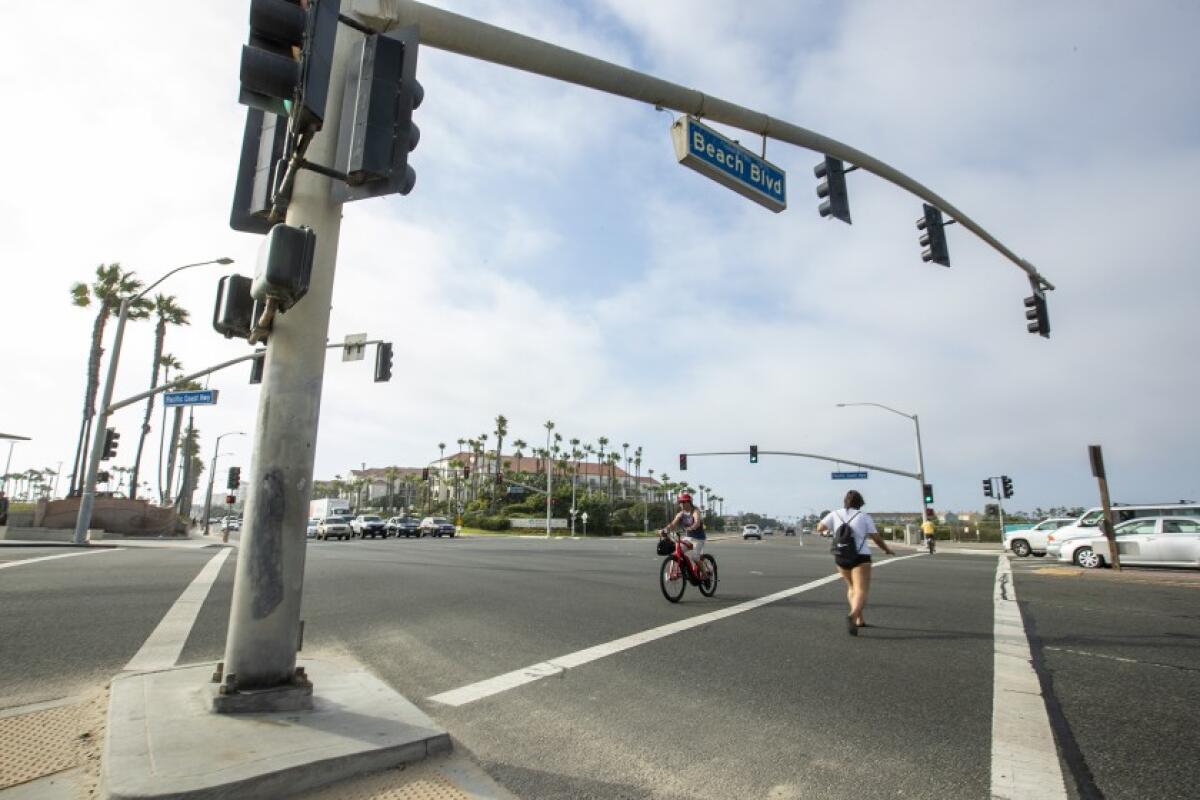H.B. approves amendments to housing plan, setting itself up for state compliance and homelessness funding

- Share via
The Huntington Beach City Council green-lighted a resolution Monday night that moves the city a step closer to resolving a dispute with state officials over the city’s housing plan and getting it certified and in compliance with state law.
The council approved amendments to the city general plan, housing element and Beach and Edinger Corridors Specific Plan, as well as a housing element progress report, by a vote of 4-3, with Mayor Lyn Semeta, Mayor Pro Tem Jill Hardy and Councilman Erik Peterson dissenting.
The Planning Commission recommended the resolution Jan. 14 after state officials sent the city a letter saying they would certify the housing element progress report if the council approved it.
That would resolve the central issue in a 2019 state lawsuit over what the state called the city’s failure to plan for enough affordable housing to meet projected population growth. It also would unlock state funding for addressing homelessness.
“I think it’s a no-brainer,” Councilwoman Kim Carr said Monday. “It’s time to get back into the good graces of the state on this. ... Let’s move forward.”
During public comments, community members who are part of the group Homeless United voiced support for the potential affordable housing.
The council’s move is designed to help Huntington Beach make up a 413-unit shortfall determined by the state in lower-income categories.
The progress report proposes accommodating the Regional Housing Needs Allocation shortfall through an “affordable-housing overlay” covering six local sites, predominantly along Beach Boulevard, and establishing by-right approval for projects that propose a minimum of 20% lower-income units onsite, meaning they wouldn’t need to go through the conditional use permit process. Additionally, no commercial component would be required and parking requirements would be slightly reduced.
“With the amendment, the city would be in line to receive certification from the state Department of Housing and Community Development, making it eligible for funds toward homelessness services,” city Deputy Director of Community Development Jennifer Villasenor said during a presentation.
Villasenor told the Planning Commission last month that the sites are either vacant or underutilized and are “all very representative of sites that have already been developed in the specific plan.”
However, the proposal turned off some council members.
“I’m just as motivated as the next person to solve homeless issues ... but that really isn’t what this is about tonight. This is an affordability issue,” Semeta said. “I’m just very, very concerned about putting a by-right development into our city now.”
“I’m not wanting to say yes to a project without knowing what it is,” Hardy said.
Adam Wood, a resident and a director of the Building Industry Assn., said during a public hearing that “this is just a zoning measure that is just going to open the door to get money back from Sacramento.”
Others opposed the resolution on grounds that it could result in more development and state involvement in local planning.
“What is going on here is legislative mandates coming down here from Sacramento,” Semeta said. “We are supposed to be able to make our own decisions, and these legislative mandates take all that away.”
However, Councilwoman Barbara Delgleize said: “Not every city is set up to do this. ... I think we are fortunate that we have the space that we do around the corridor.”
“I think it’s time that we as a City Council do what we can do to help,” Councilman Patrick Brenden said.
All the latest on Orange County from Orange County.
Get our free TimesOC newsletter.
You may occasionally receive promotional content from the Daily Pilot.




